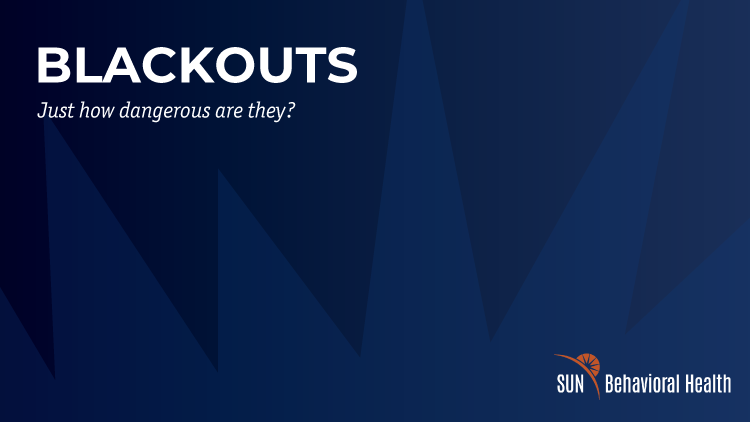Services

If you’re familiar with binge drinking, you’re probably familiar with alcohol blackouts. The two tend to go hand-in-hand. Maybe you’ve had a night or two where you’ve gone out with friends and had a little too much to drink, only to find you can’t remember the whole evening the next morning. This is fairly common – drinking too much alcohol can cause lapses in memory, a.k.a “blackouts”.
At SUN Behavioral Health Delaware, we know blackouts can be easy to brush off or minimize later. We also know they’re not safe, and they have a history of causing problems. What kind of consequences come with blacking out after drinking? Can you recover, or do blackouts create lasting damage? Just how dangerous are they?
Alcohol blackouts are temporary lapses in memory. They usually occur as a result of binge drinking, which is when someone has five or more drinks in one sitting. Some people experience blackouts more frequently than others, and there is no guarantee that you will or will not experience one. Because everyone is biologically different, not everyone will experience the same types of blackouts or experience any blackouts at all. Here are some common factors that play a role in whether or not someone experiences blackouts (and how severe/frequent those blackouts are):
Alcohol affects many areas of the body, including the brain. The hippocampus, or the part of the brain responsible for memory, is particularly sensitive to binge drinking. When enough alcohol is ingested, the brain becomes incapable of forming new memories. It’s almost as if the hippocampus becomes tired and goes to sleep. This is risky for a number of reasons:
A blackout or two is not necessarily a sign that you’re managing an alcohol use disorder. However, if you’re noticing blackouts more frequently, or if you’re making dangerous decisions while blacking out and you can’t seem to stop, your safety is in jeopardy and it’s time to seek treatment for alcohol use disorder.
Many people know when it’s time to stop drinking. They start to feel lightheaded or tired and they know they’re becoming inebriated, so they decide to stop. But for others, there is no “signal” that tells them to stop drinking. They continue to drink regularly, even when they’re aware of the mental and physical toll it’s taking on their body. If this reminds you of yourself or someone you love, you’re not alone. More than 14% of people in Delaware participate in binge drinking.
Here are some of the most common dangers of binge drinking:
If you or someone you love is having a hard time controlling how much alcohol they drink (or how often they drink), it might be time to seek treatment. At SUN Behavioral Delaware, we know that every patient’s healing journey is unique. That’s why we offer a large variety of treatment programs for alcohol use disorder.
Alcohol detox happens in the first 72 hours after your last drink. It’s the process your body goes through to flush the alcohol out of its system. During this time, your body is working hard to rid itself of any toxins left behind. This is when withdrawal symptoms usually start, peak, and subside.
SUN Behavioral Health’s Alcohol Detox happens during this time. You’ll come in and meet with one of our clinicians to be assessed for your needs and to create some goals for yourself. People who choose detox stay in our facility so we can monitor their condition, treat their withdrawal symptoms, and help them heal safely and efficiently.
Inpatient treatment provides patients with a stable and supportive environment. Here, they can focus on their recovery while being surrounded by trained and licensed professionals and others who are going through the same thing. The side effects of alcohol use are also treated in this environment.
During inpatient treatment, patients stay on sight at the rehab facility 24/7. They get to experience a wide variety of activities and programs during their day from individual therapy sessions and group sessions to activities such as yoga or hobbies that help rebuild new habits and focus the mind on healing.
If inpatient treatment doesn’t work for your schedule or your lifestyle, outpatient and PHP can help. Outpatient programs can also act as a stepping stone between inpatient and the end of treatment. This type of care usually does not require patients to stay at the facility while being treated. When visiting the facility, patients spend time in customized sessions throughout the day. This can be beneficial for full-time employees seeking treatment because it allows patients to continue to maintain a life outside of treatment.
If you or someone you know is living with an alcohol use disorder, SUN Behavioral Health Delaware can help. If you have any questions or would like to learn more about our available treatment options, call us today at 302-604-5600 so we can help you get your life back.
The best way to avoid a blackout is to stick to CDC’s guidelines when it comes to alcohol consumption. This means 2 glasses per day are okay for men and 1 glass per day is okay for women. Another way to help reduce the risk of blackouts is to make sure you space out your drinking, never drink on an empty stomach, and stop drinking when you start to feel “buzzed” or intoxicated.
If you notice someone has become intoxicated to the point of blacking out, stick with them. The best thing to do is take them home where they’re safe (or to a hospital if you notice signs of alcohol poisoning). People who are experiencing blackouts often have poor judgment and lowered inhibitions, and alone, they’re likely to make dangerous decisions. Make sure they’re not drinking and driving or going home with someone they don’t know.
Always call 911 if someone is experiencing an emergency involving alcohol. You can also call poison control at 800-222-1222.